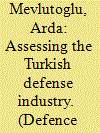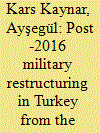|
|
|
Sort Order |
|
|
|
Items / Page
|
|
|
|
|
|
|
| Srl | Item |
| 1 |
ID:
153713


|
|
|
|
|
| Summary/Abstract |
The reform process of Turkish defense industry as launched in the last quarter of the twentieth century has seen several achievements, as well as downfalls, and passed through major milestones. The resultant industrial structure is unique, compared to the other sectors in the country. Dominated by the TSKGV (Turkish Armed Forces Foundation), the major goal of the sector has always been involved in attaining self-sufficiency, indicative of an import substitution-oriented industry policy. This strategy is evident in decision-making and execution processes of virtually all defense procurement programs. However, lack of an efficient mechanism for science and technology policy-making mechanism, is observed as a major obstacle toward sustainable development of the sector. Although benefited from the overall economic take-off during the 2000s, today the Turkish defense industry faces to the challenge of sustainability, which is heavily dependent on export performance. The forthcoming period will test the sector, revealing the necessary coordination and communication by and between the military and civilian bureaucracies.
|
|
|
|
|
|
|
|
|
|
|
|
|
|
|
|
| 2 |
ID:
160656


|
|
|
|
|
| Summary/Abstract |
Previous studies on the relationship between individual’s enlistment decisions and their personal characteristics examined a number of variables such as age, marital status, gender, family background, geographical background, employment situation and education level. However, attitudes towards working, expectations from a good job and centrality of working are also important determinants in this process. This paper examines the profile of juveniles who seek a career as gendarmerie non-commissioned officers (NCO) in the Turkish Armed Forces and their attitudes and expectations towards working in general within the framework of Meaning of Working (MOW) researches. According to the results of the survey conducted with 500 NCO candidates in Turkey, learning something new, good relations with colleagues and employment guarantee are detected as the main expectations of juveniles who seek a career in military. Results also show that having a job is so important for these young people that they consider having a job even prior to their families.
|
|
|
|
|
|
|
|
|
|
|
|
|
|
|
|
| 3 |
ID:
185545


|
|
|
|
|
| Summary/Abstract |
This article focuses on the post-2016 military reforms and examines the meaning of civilian oversight and control that these reforms have brought. For almost two decades, the establishment of civilian supremacy over the military has been discussed in terms of democratic control of the armed forces. The article claims that although the post-2016 reforms installed civilian supremacy, they diverge from this approach significantly. Instead, they display the basic characteristics of coup-proofing strategies. The article aims to ignite scholarly interest in and initiate discussions on the conceptual appropriateness of the notion of coup-proofing for capturing Turkey’s civil–military relations since 15 July 2016.
|
|
|
|
|
|
|
|
|
|
|
|
|
|
|
|
| 4 |
ID:
130145


|
|
|
| 5 |
ID:
113215


|
|
|
|
|
| Publication |
2012.
|
| Summary/Abstract |
This article is an extended book review of the Turkish book Commanders' Front (Komutanlar Cephesi, Istanbul: Detay Publishing, 2007), written by prominent Turkish journalist Fikret Bila, who compiled a series of interviews with retired Turkish military commanders and two former presidents. It provides a foreign perspective on counterinsurgency/terrorism strategies and lessons learned from Turkey's small war against the Kurdistan Workers' Party (PKK). The interviews reveal the generals' views on Turkey's long-standing fight with the PKK, discussing topics ranging from the social aspect of the PKK problem to mistakes made in arming local militia. In addition, it presents the Turkish perspective on US policy in Iraq.
|
|
|
|
|
|
|
|
|
|
|
|
|
|
|
|
| 6 |
ID:
174835


|
|
|
|
|
| Summary/Abstract |
Motivation is a key factor for the military institution to accomplish its goals. Extant academic research, however, has generally focused on the combat motivation and the motivation to serve has been understudied. This study examines the motivation to serve and its predictors among Turkish military officers and NCOs. The aim of the current study is 2-fold: (1) to test the effectiveness of measures proposed by previous studies in Turkish Armed Forces and (2) to build on the existing body of knowledge by showing the impacts of perceived fairness and satisfaction with social benefits. Survey data, which were conducted only 2 months before the coup attempt in Turkey on July 15, 2016, were used to assess the motivation. Findings revealed that institutional and moral commitments, organizational responsiveness, perceived fairness, and satisfaction with social benefits were positive significant determinants of motivation to serve, while occupational commitment had a negative relationship with it.
|
|
|
|
|
|
|
|
|
|
|
|
|
|
|
|
|
|
|
|
|